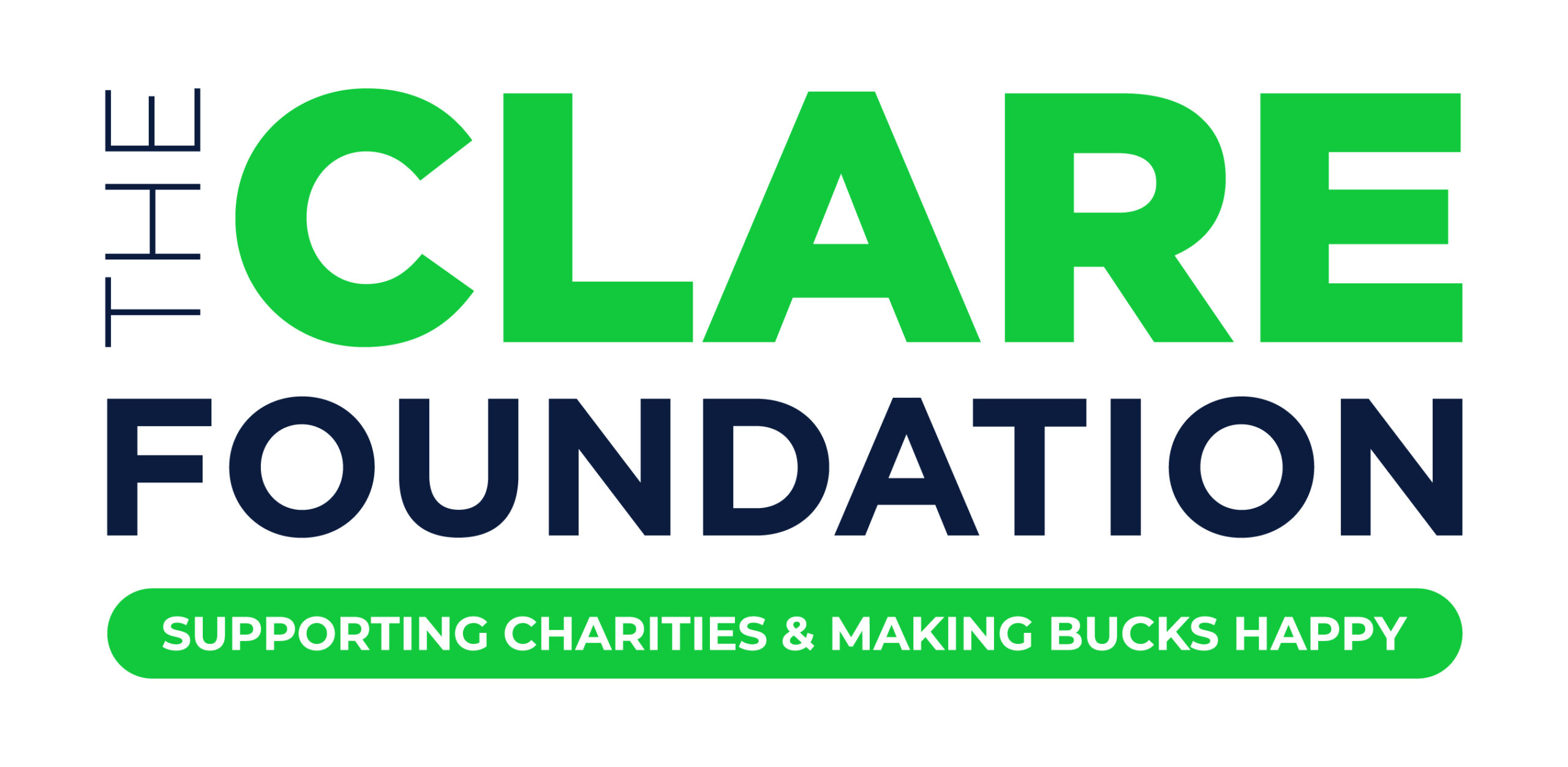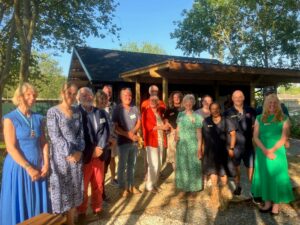Volunteers Week 2022
1st June 2022 marks the start of Volunteers’ Week, an annual celebration of the contribution millions of people make across the UK through volunteering. These last few years have highlighted the vital role volunteers play across the UK and The Clare Foundation want to add our voice in recognising and thanking volunteers here in Bucks. In preparation for Volunteers Week 2022 we hosted an online workshop with Volunteering Strategist, Gethyn Williams; and we are delighted to share the recording and a guest blog written by Gethyn.

Revisiting Volunteer Recognition, Gethyn Williams
If you joined us, you’ll already know that our intention was to explore this concept from a number of different angles – to ‘circumambulate’ recognition in order to see what more we could uncover, and perhaps reconsider how we approach it in our own organisations. Held just a short period before this year’s Volunteers’ Week, it was the perfect time for such an exercise.
If you’d like to check out the recording of the session: https://youtu.be/0y2yWJof5hE, you’ll see that I organised the content around three key questions:
- Firstly. what do we mean by volunteer recognition? Here we asked ourselves where recognition fits in the timeline of the volunteer’s journey? What kind of national moments populate the volunteer recognition calendar, and what are the common approaches used within volunteer-involving organisations?
- Secondly, why is recognition important? Here we took a look at the evidence based around volunteer satisfaction – drawing heavily on NCVO’s Time Well Spent – and considered a whole range of reasons why you and your organisation might want to devote more energy to recognising your volunteers.
- And finally, how can we in volunteer-involving organisations do recognition well? Here we summarised five guiding themes or principles to help your recognition efforts become more targeted and achieve a greater impact. The rest of this introductory post simply summarises these five suggestions.
Thank you for reading. If you’d like to discuss any of the content here, or are interested in exploring what support I could provide for you on your own volunteer programme, please get in touch for a chat.

Volunteer Recognition: How can we do it well?
Five suggestions to revamp your approach
Do it all year round
Your volunteers are one of your key stakeholder groups, which means they deserve your attention on a regular basis. In many ways they’re a unique audience, very invested in your organisation and its success, and their volunteering with you may also form a big part of their personal identity. So make sure you’re talking to them all year round, not just when you need something from them. This doesn’t have to be the responsibility of the Volunteer Manager alone – ensure your Communications or Marketing colleagues appreciate volunteers as a distinct audience.
One suggestion is to plan a year-round calendar of engagement; sometimes this will be as simple as an opportunity to pass on information, at other times it will be more active and two-way. It can include national moments on which you might piggyback (like Volunteers’ Week) and internal milestones like your AGM or awards ceremonies. If you’re short on resource, consider how you can use ‘exclusivity’ with your volunteers – what can you tell them that you’re doing, before you make it public? Giving them an exclusive – an advance notice or opportunity – is one easy way of showing them you recognise their importance to you.
Make it personal
Recognition can be built into every interaction we have with our volunteers, whether that’s something planned and formal (like an awards ceremony) or more spontaneous and informal (a simple thank you after they’ve helped out). Considering recognition at every point of contact – and encouraging others in your organisation to do the same – will help you build a culture of recognition. Perhaps think about your internal meeting cycles and whether volunteering can be a standing item; you could use this to build awareness of the contribution they are making, or share feedback from volunteers with your colleagues.
But good recognition doesn’t have to end there. It’s often easy to consider volunteers as one homogenous group, but of course we know they are not. They will fulfil many different roles and exhibit a range of personas, generating value and expressing their needs in different ways. Marketing approaches can help us here – try ‘segmenting’ your volunteers into different groups and planning your interactions with them accordingly. This might mean capturing different aspects of their impact (a trustee will deliver a very different kind of value to a one-off event volunteer) or considering what’s likely to influence their satisfaction as a volunteer (NCVO’s Time Well Spent is a great resource for helping you to understand which types of volunteers may be more vulnerable to a negative experience).
Make them part of the team
As volunteering leaders part of our job is to champion the efforts of our volunteers within the wider organisation – make sure you take opportunities to educate colleagues on who your volunteers are, what they do and how that relates to your mission. You might consider how you give volunteers more of a platform or voice internally – perhaps through regular surveys, or other ad hoc ways of asking for their insights or ideas. You can also think about how you might strengthen their identity as a group; London 2012 used uniforms powerfully in this way, but organising a social occasion for volunteers can have a similar bonding effect, helping them to reflect on their identity as a volunteer with you.

A simple thank you
The quick, regular thank you can become a real cornerstone of your culture of recognition. Glitzy, formal showpiece occasions (like awards ceremonies) are an important part of celebrating the volunteering movement generally, but may not be attractive to all volunteers. When surveyed again and again, London 2012 volunteers consistently said that a simple thank you was the best reward they could hope to receive.
And you might also want to consider who delivers it; whilst recognition from a formal leader in your organisation might be appealing to some, many volunteers say a thank you from those they are helping (whether that’s staff, other volunteers or beneficiaries) is often much more meaningful for them. Some programmes even engage individuals as honorary figureheads for their volunteer programmes, often a galvanising figure commanding huge respect from the volunteer base. This was the role that Eddie Izzard played for the Games Makers at London 2012, but many of us will have a longstanding ‘super volunteer’ in our ranks who might be able to fulfil a similar, ambassadorial role.
Acknowledging the bad (as well as celebrating the good)
Finally, remember that your volunteers are a unique audience – a little like staff (they help you get things done) and a little like beneficiaries or customers (they need something from their relationship with you). And yet they are not quite either, but as a result they see your organisation and the things you deliver from a unique perspective. This makes them valuable strategic partners, making an authentic relationship with them even more important.
Another way of recognising their significance is to share the bad news as well as the good. They are invested in your organisation and will want to help. If the ‘bad news’ is something you need to share with staff, don’t exclude your volunteers if you can help it. Giving volunteers parity with staff, where appropriate, can be an effective form of recognition. And if the bad news is about volunteering specifically – perhaps negative feedback from a survey – sharing it (anonymously) is another way of recognising what they’re telling you and developing a more mature relationship with the group. Ask for their help in fixing it – co-producing solutions with your volunteers is a great way to turn a challenge into positive growth.
So, for this Volunteers’ Week why not revisit your approach to volunteer recognition? I hope some of the above helps you to do that, and please join the conversation on social media and share your own tips.
Gethyn Williams is a Volunteering Strategist with experience of running large programmes in national charities, advising central government on policy and supporting volunteer-involving organisations to reinvent or redevelop their programmes.



